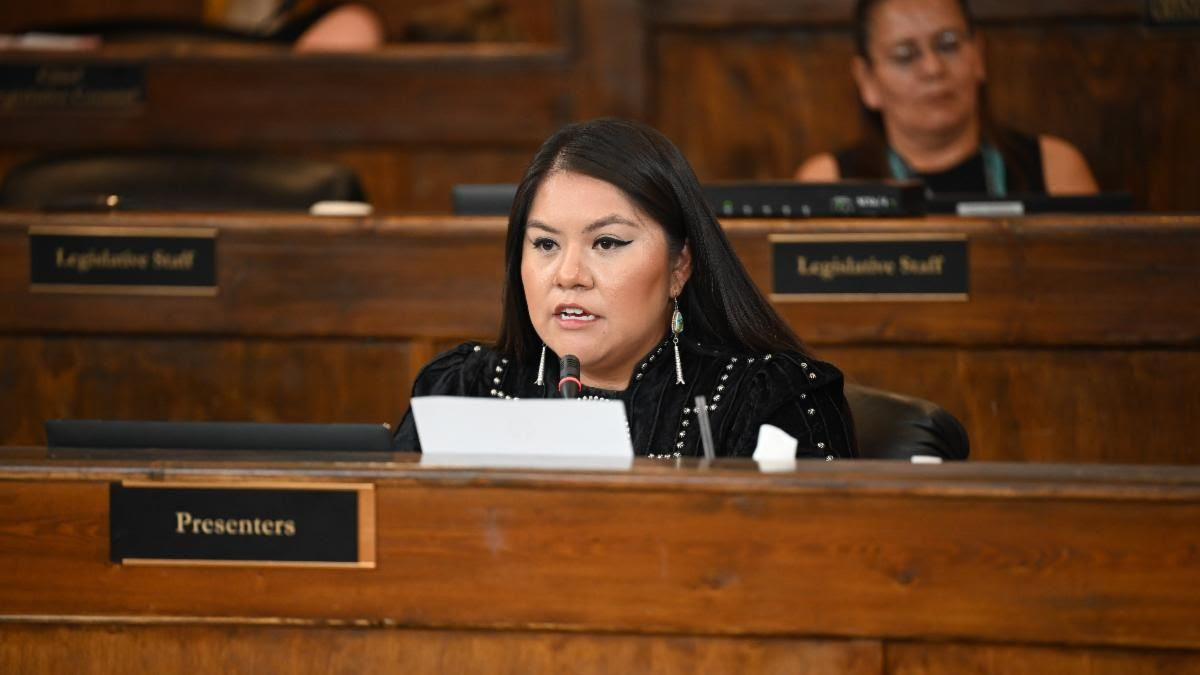
- Details
- By Native News Online Staff
On September 4, the 25th Navajo Nation Council unanimously passed Legislation No. 0195-25, officially approving the Comprehensive Budget for Fiscal Year 2026, totaling $603.7 million.
The budget was developed through a data-informed process led by the Budget and Finance Committee (BFC). Base funding levels were calculated using the average expenditures from the past three years, along with a 15% growth factor recommended by BFC advisors. When evaluating unmet needs after budget reviews by the Oversight Committees, the BFC applied a formula created by Controller Sean McCabe, which factored in FY2025 expenditure trends. This approach ensured that allocations aligned with actual spending patterns across the government.
Legislation No. 0195-25 was introduced by Council Delegate Shaandiin Parrish, Chair of the BFC, and co-sponsored by Speaker Crystalyne Curley. The legislation seeks to ensure that local chapters are adequately funded, feedback from public budget hearings is implemented, and that essential government operations remain supported.
The FY2026 budget focuses on increasing support for personnel, directing more funding to local chapters, and maintaining the stability of the central government in Window Rock. Major allocations include:
-
$524.1 million for the Executive Branch
-
$19.9 million for the Legislative Branch
-
$19.2 million for the Judicial Branch
-
$40.3 million for fixed costs
-
$11.4 million for the Veterans Trust Fund
-
$7.6 million for chapter houses via General and Permanent Lapse Funds
The Council also approved a series of targeted funding increases, including:
-
$4.4 million for chapters
-
$2.9 million for Summer Youth Employment
-
$1.5 million for solid waste projects
-
-
$1.9 million for the Division of Public Safety
-
$2.3 million for the Missing & Murdered Indigenous Persons (MMIP) Unit
-
$750,000 for a centralized database
-
$300,000 for police department needs
-
$1.2 million for criminal investigators
-
-
$2.5 million for Victim Advocates
-
$3.6 million for Veterans Services
-
$3 million for direct services
-
$550,000 for Navajo Nation Certified Veterans Organizations (NNCVOs)
-
-
$1.8 million for the Division of Aging and Long-Term Care Support (DALTCS)
-
$1.3 million for probate costs in the Judicial Branch
-
$176,079 for Economic Development reallocations
-
$2 million for the Johnson O'Malley (JOM) program
Amendment One created personnel lapse savings pools for all three branches, allowing funds from vacant positions to be reallocated. It also established a requirement for an administrative process to be implemented within 30 days of enactment. A total of $15.5 million was distributed to cover requested personnel and vacancy funding across branches and chapters.
The FY2026 budget reflects months of collaboration between the BFC, Office of Management and Budget, Controller’s Office, and leadership across all three branches of government. Structural improvements were also introduced, including safeguards for chapter-level funding, reduced mid-year transfers, and corrections to discrepancies in programs such as Summer Youth Employment.
Public input played a critical role in shaping the budget. During the August 26 BFC Public Hearings, the Office of Legislative Services reported strong community requests for increased chapter-level funding, more resources for public safety, and additional support for probate and veterans’ services. The Council responded with targeted amendments that expanded general fund allocations in each of these areas.
The Council passed Legislation No. 0195-25 with a unanimous 17–0 vote. Upon certification, the resolution will be sent to the Office of the President and Vice President, where President Buu Nygren will have up to ten calendar days to review and consider the legislation.
More Stories Like This
50 Years of Self-Determination: How a Landmark Act Empowered Tribal Sovereignty and Transformed Federal-Tribal RelationsNavajo Nation Council Members Attend 2025 Diné Action Plan Winter Gathering
Ute Tribe Files Federal Lawsuit Challenging Colorado Parks legislation
NCAI Resolution Condemns “Alligator Alcatraz”
NABS Documents 134 More Survivor Stories, Expands Digital Archive in 2025
Help us defend tribal sovereignty.
At Native News Online, our mission is rooted in telling the stories that strengthen sovereignty and uplift Indigenous voices — not just at year’s end, but every single day.
Because of your generosity last year, we were able to keep our reporters on the ground in tribal communities, at national gatherings and in the halls of Congress — covering the issues that matter most to Indian Country: sovereignty, culture, education, health and economic opportunity.
That support sustained us through a tough year in 2025. Now, as we look to the year ahead, we need your help right now to ensure warrior journalism remains strong — reporting that defends tribal sovereignty, amplifies Native truth, and holds power accountable.
 The stakes couldn't be higher. Your support keeps Native voices heard, Native stories told and Native sovereignty defended.
The stakes couldn't be higher. Your support keeps Native voices heard, Native stories told and Native sovereignty defended.
Stand with Warrior Journalism today.
Levi Rickert (Potawatomi), Editor & Publisher


